| Srl | Item |
| 1 |
ID:
191708
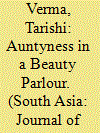

|
|
|
|
|
| Summary/Abstract |
Interactive service work in various middle- and upper-class settings has created visible disparities between those who seek the work and those who provide it. In addition to beauty work, beauty parlours require emotional/affective work, widening the class gap between sellers and consumers by requiring further labour on the part of the worker. However, within the smaller beauty parlours existing in the by-lanes of larger Indian markets, there is the possibility of creating shared space through conversations and care through a mobilisation of ‘auntyness’. In this paper, I explore how the conversations in a New Delhi beauty parlour lead to the creation of aunties that challenges the limits of interactive service work and enables temporary communities of kinship and care that hinge upon the participants’ performances of the styles, affects and values associated with aunties.
|
|
|
|
|
|
|
|
|
|
|
|
|
|
|
|
| 2 |
ID:
088846
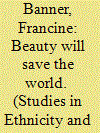

|
|
|
|
|
| Publication |
2009.
|
| Summary/Abstract |
This paper utilises the case study of the recent Miss Chechen Beauty pageant in order to discuss the ways in which gendered discourses and practices have affected the situation of women in the post-war Chechen Republic. Although, on the surface, they appear to have little in common, the paper draws on connections between women's bodies and nation-states in order examine practices such as beauty pageants, honor killings, and government-enforced modesty campaigns that are currently taking place in the republic. Ultimately, the paper argues that beauty contests and modesty campaigns share in common the fact that they are being utilised by the state to relegate women to private spaces and to re-enforce gender hierarchies in the aftermath of two brutal conflicts
|
|
|
|
|
|
|
|
|
|
|
|
|
|
|
|
| 3 |
ID:
181680
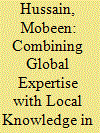

|
|
|
|
|
| Summary/Abstract |
This article traces the evolution of branded commodity advertising and consumption from corporeal health concerns to the racialisation of beauty through skin-lightening cosmetics in late colonial India. It centres two empirical foci: the marketing of personal hygiene products to Indian markets, and their racialised and gendered consumption. This article argues that the imperial economy tapped into and commodified ideals of cleanliness, beauty and fairness through marketing—ideals that continue to pervade contemporary South Asian communities. Contrary to claims that multinational corporations permeated Indian markets after the economic liberalisation of the late 1980s, there is a much deeper genealogy to the racialised imperial economy operating in European colonies. This article also examines the phenomenological underpinnings of imperial whiteness in colonial encounters to demonstrate how certain commodities appealed to Indians as ‘modern’ consumers, as well as how middle-class Indians and local entrepreneurs became active participants in the demand for, consumption and production of personal hygiene commodities.
|
|
|
|
|
|
|
|
|
|
|
|
|
|
|
|
| 4 |
ID:
148892
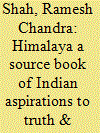

|
|
|
| 5 |
ID:
158076
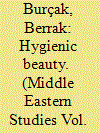

|
|
|
|
|
| Summary/Abstract |
This article examines discussions on Ottoman-Muslim female beauty, health and hygiene in the Hamidian Era (1876–1909). Analysing the Hamidian popular press, advice literature and textbooks for girls, the article argues that these discussions were more than just female ‘physical culture’ debates, involving larger issues of late-Ottoman regeneration. Wars, epidemics, massive migration movements and fluctuations in population pushed the late-Ottoman state to create healthy generations as a productive force to secure the Empire's future in general and the Ottoman Muslim population's welfare in particular. Maintaining good health expanded from a religious obligation into now also becoming a patriotic duty incumbent upon Ottoman subjects knowing and applying modern hygienic principles. Focus on Ottoman-Muslim women's procreativity shifted female beauty into a public discussion, now defined as a reflection of health. The new hygienic beauty discourse distinguished between preserving vs. harming one's health in the face of Western fashions and cosmetics: healthy beauty mirrored a ‘good complexion’.
|
|
|
|
|
|
|
|
|
|
|
|
|
|
|
|
| 6 |
ID:
085003
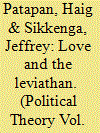

|
|
|
|
|
| Publication |
2008.
|
| Summary/Abstract |
Hobbes's understanding of love, and its significance for his political thought, has received insufficient attention. This essay contends that Hobbes has a consistent and comprehensive teaching on love that directly repudiates what he regards as the Platonic teaching on eros. In attacking the Platonic idea of eros, Hobbes undermines a pillar of classical political philosophy and articulates a significant aspect of his new understanding of the passions in terms of power, which is itself a critical part of his new political science most famously presented in Leviathan
|
|
|
|
|
|
|
|
|
|
|
|
|
|
|
|
| 7 |
ID:
085338
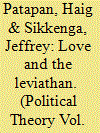

|
|
|
|
|
| Publication |
2008.
|
| Summary/Abstract |
Hobbes's understanding of love, and its significance for his political thought, has received insufficient attention. This essay contends that Hobbes has a consistent and comprehensive teaching on love that directly repudiates what he regards as the Platonic teaching on eros. In attacking the Platonic idea of eros, Hobbes undermines a pillar of classical political philosophy and articulates a significant aspect of his new understanding of the passions in terms of power, which is itself a critical part of his new political science most famously presented in Leviathan.
|
|
|
|
|
|
|
|
|
|
|
|
|
|
|
|